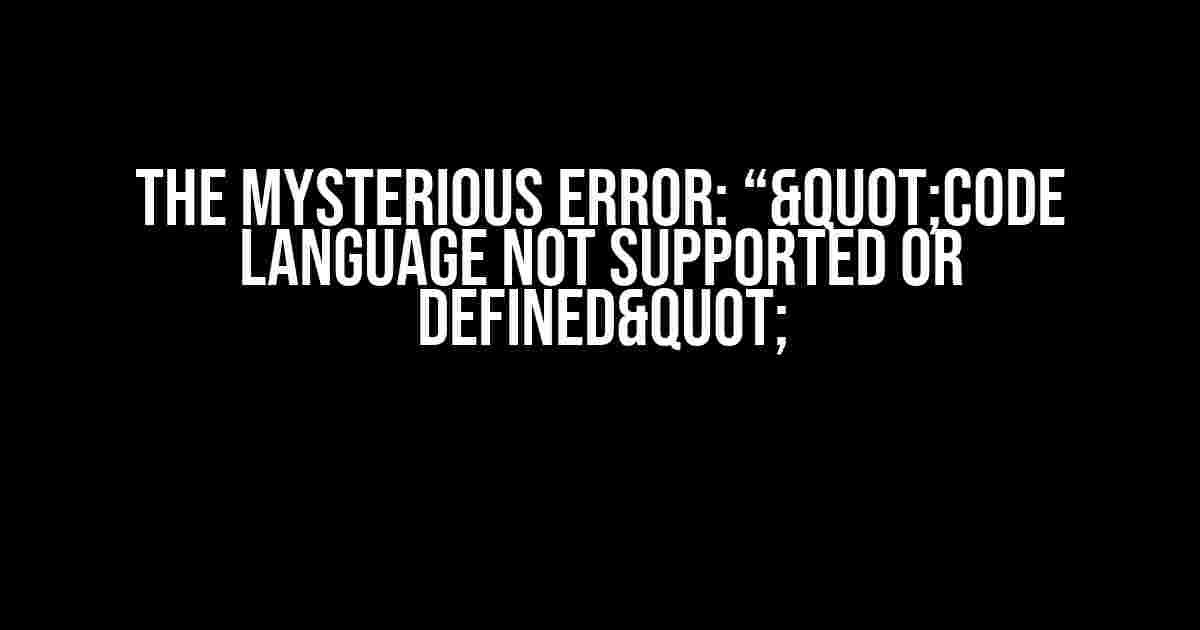Are you tired of getting the infamous “"Code language not supported or defined"” error while trying to run your Fortran 77 code with a .f file? You’re not alone! This error has been the bane of many programmers’ existence, but fear not, dear reader, for we’re about to embark on a journey to vanquish this error once and for all.
What is Fortran 77, and why is it still relevant?
Fortran 77, also known as FORTRAN 77, is a programming language that was first introduced in the 1970s. Yes, you read that right – the 1970s! Despite being an old language, Fortran 77 is still widely used in various fields such as scientific computing, numerical analysis, and engineering. Its performance, reliability, and ease of use make it a popular choice among researchers and developers.
So, what’s the issue with running Fortran 77 code?
The problem lies in the fact that modern compilers and IDEs might not support Fortran 77 code out of the box. This is because Fortran 77 is an older language, and most modern systems are designed to work with newer versions of Fortran, such as Fortran 90 or later. This is where the “"Code language not supported or defined"” error comes in – it’s the compiler’s way of telling you that it doesn’t recognize the language or syntax used in your code.
Step-by-Step Guide to Running Fortran 77 Code with a .f File
Don’t worry, dear reader, for we’ve got you covered! Below is a step-by-step guide to help you run your Fortran 77 code with a .f file:
Step 1: Choose a Suitable Compiler
gfortran(GNU Fortran Compiler): A popular and widely used compiler that supports Fortran 77 code.f2c(Fortran to C Translator): A compiler that translates Fortran 77 code to C code, which can then be compiled using a C compiler.ifort(Intel Fortran Compiler): A commercial compiler that supports Fortran 77 code, but requires a license.
Step 2: Install the Compiler
Depending on your operating system, you can install the chosen compiler using the following methods:
gfortran: Install using your package manager (e.g.,apt-geton Ubuntu orbrewon macOS).f2c: Download and install from the official website.ifort: Download and install from the Intel website (requires a license).
Step 3: Write and Save Your Fortran 77 Code
Write your Fortran 77 code using a text editor or IDE, and save it with a .f file extension (e.g., example.f). Make sure to follow the Fortran 77 syntax and conventions.
PROGRAM example
WRITE (*,*) 'Hello, World!'
END
Step 4: Compile Your Fortran 77 Code
Compile your Fortran 77 code using the chosen compiler:
gfortran:gfortran -o example example.ff2c:f2c -o example example.fifort:ifort -o example example.f
Step 5: Run Your Executable
Run the compiled executable file:
./example
Troubleshooting Common Issues
If you’re still encountering issues, don’t worry! Here are some common problems and their solutions:
| Error Message | Solution |
|---|---|
| "Undefined symbols" | Check that your compiler is installed correctly and that your code is correct. |
| "File not found" | Verify that your code file is in the correct directory and that the file name is correct. |
| "Compiler not recognized" | Check that your compiler is installed correctly and that the path to the compiler is correct. |
Conclusion
There you have it, folks! With these simple steps and troubleshooting tips, you should be able to run your Fortran 77 code with a .f file. Remember, perseverance and patience are key when dealing with older languages like Fortran 77. Happy coding!
Still having issues? Leave a comment below, and we’ll do our best to help you out.
Want to learn more about Fortran 77 and its applications? Check out our other articles and tutorials on the subject!
Additional Resources
- Fortran 77 Tutorial for Beginners
- Fortran 77 vs. Modern Fortran: What’s the Difference?
- Top 5 Applications of Fortran 77 in Science and Engineering
Stay tuned for more programming tutorials and articles!
Frequently Asked Question
Don’t let the dreaded “Code language not supported or defined” error hold you back from running your Fortran 77 code! Here are some frequently asked questions to get you back on track:
Why is my Fortran 77 code giving me the “Code language not supported or defined” error?
This error usually pops up when the compiler can’t identify the language of your code. Make sure your file has a `.f` extension, as this is the typical file extension for Fortran 77 code. Also, double-check that your code doesn’t contain any syntax errors or typos that might be confusing the compiler.
Is it possible that my compiler is not compatible with Fortran 77?
Yes, that’s a possibility! Not all compilers are compatible with Fortran 77. Check if your compiler supports Fortran 77 or if you need to use a different compiler. You can also try using a modern Fortran compiler that supports the older Fortran 77 standard.
How can I specify the language standard for my Fortran code?
You can specify the language standard using compiler options or directives. For example, with the GNU Fortran compiler, you can use the `-std=f77` option to specify the Fortran 77 standard. Check your compiler’s documentation for the specific options or directives you need to use.
Can I use a Makefile to compile my Fortran 77 code?
Yes, you can! A Makefile can be a great way to organize your compilation process. You can specify the compiler options and flags required for your Fortran 77 code in the Makefile. Just make sure to include the correct compiler and options for your code.
What are some common pitfalls to avoid when compiling Fortran 77 code?
Some common pitfalls to avoid include not specifying the correct file extension, not using the correct compiler options, and not checking for syntax errors in your code. Additionally, be mindful of any compatibility issues with your operating system or compiler.

